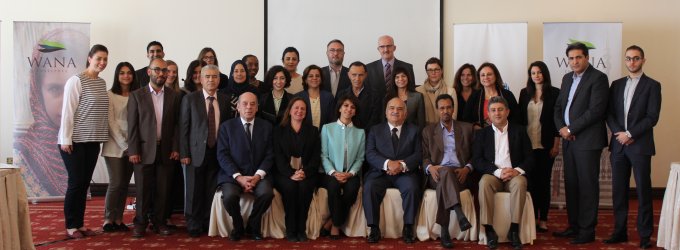-
Academia and the Humanitarian Sector: Partners in ...
Academia and the Humanitarian Sector: Partners in Responding to the Region's Displacement Crisis?
The West Asia-North Africa region is facing the biggest displacement crisis since World War II. During a first of its kind event, academics from across the MENA region underscored the need for academia to be more pro-active by generating evidence-based solutions, informing programming and influencing policies relating to displacement.
While representing 6% of the world’s population, the MENA region accounts for 38% of global displacement, with most countries in the region being affected as countries of origin, transit or destination.
During the two-day roundtable event on April 26 and 27, organised by the West Asia – North Africa (WANA) Institute and the United Nations High Commissioner for Refugees (UNHCR) Middle East and North Africa office, renowned professors discussed the importance of refugees’ access to higher education, and how academic research can feed into policy development and humanitarian planning.
HRH Prince El Hassan bin Talal joined the roundtable as the WANA Institute’s chairman to give a final speech in which he thanked UNHCR for its ongoing work in the region and for renewing discussions on the better understanding of refugee concepts.
The role of academia in dealing with displacement
Over the past years, academia in the region has demonstrated a strong ability to contribute to a better understanding of refugee crises. Researchers have also contributed to challenging the negative narrative about refugees in host countries.
More in-depth analyses are needed on the long-term impact of refugee movement and policies responding to it. Academia is uniquely placed to examine many of these questions.
Lack of resources and access to data
The roundtable discussion identified several challenges faced by knowledge generating institutions working on displacement issues. Researchers addressed the lack of resources for research and the slow response by academia to the current refugee crisis in the region.
One of the reasons is that much attention is given to exact sciences, engineering and law, while there is a pressing need for stronger emphasis on the social sciences and humanities. Through this field, social research funds can be allocated to respond to a displacement crisis of this scale. The need for access to data was highlighted as a requirement for more such research.
Improving cooperation between academia and policymakers
Stronger coordination amongst academics is needed to establish programmatic-research partnership on displacement in the MENA region. More engagement is needed as well with organisations that use evidence for policy creation to bridge the gap between academic, policy, and humanitarian development stakeholders.
Participants also stated that academics can better distinguish between academic research for the sake of knowledge and academic research for policy. “Often we do research as academics because we want to understand a topic, but we should take the extra step of addressing the policy applications too.”

